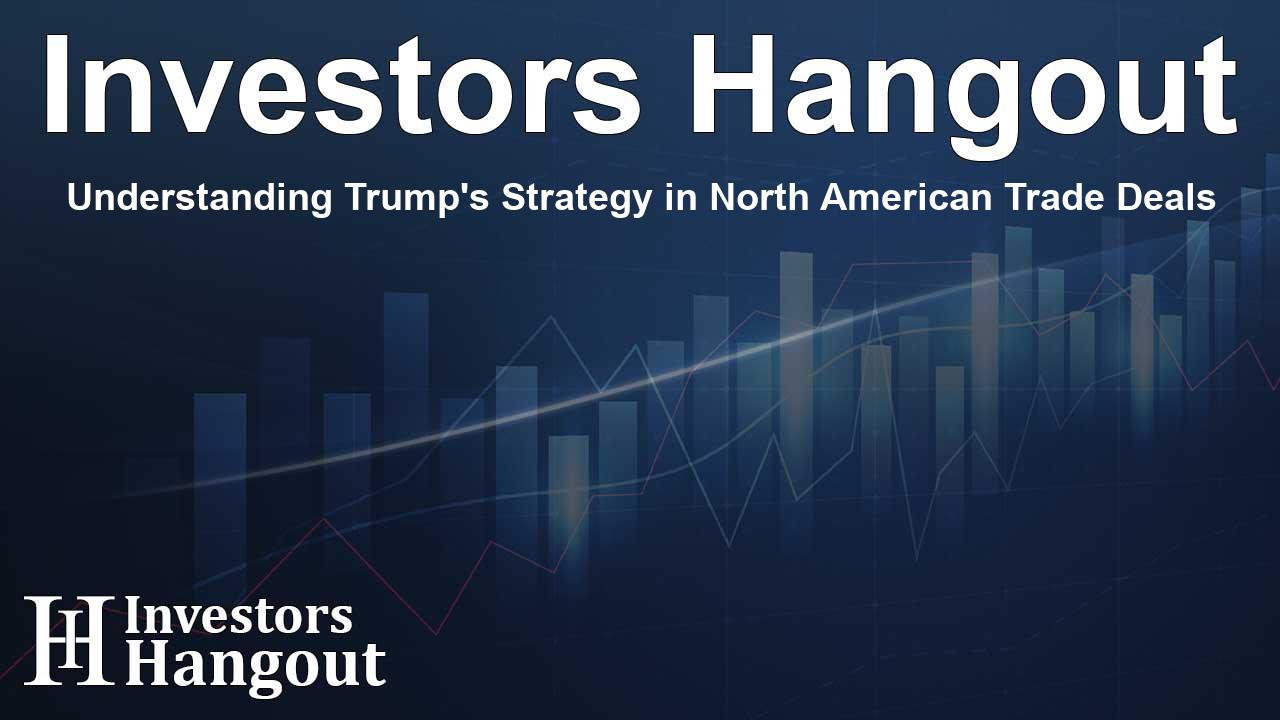Understanding Trump's Strategy in North American Trade Deals

The Geopolitical Landscape: Trump's Aims with Canada and Mexico
When it comes to North American relations, President Donald Trump's ambitions are multi-faceted. His stance on Mexico is clear-cut; he views it as a security threat that must manage drug trade and illegal immigration. Trump demands Mexico clamp down on cartels and control the influx of illegal substances. However, his concerns extend beyond just immigration, particularly as Mexico serves as a bridge for Chinese companies to bypass U.S. tariffs. For Trump, this situation poses an unacceptable strategic risk.
Canada's Role in Trump's Vision
Turning our attention to Canada, the specifics of what Trump desires are less straightforward yet equally crucial. The administration recognizes Canada's immense value, particularly in energy matters, striving to establish a secure and unified energy bloc within the Western Hemisphere. This approach underscores the administration's ultimate goal of achieving both economic stability and national security.
Examining Trump's Tariff Approach
Trump's initial forays into global trade wars were marked by a series of tariffs designed to uphold his "America First" policy. Recently, Colombia served as a prime example where, after imposing a hefty tariff in retaliation for immigration issues, President Gustavo Petro had to concede and accept his government's responsibilities. The implications of such measures resonate deeply, hinting at Trump's broader objectives.
Mexico's Cooperation and Canada's Strategic Importance
With Mexico, President Claudia Sheinbaum has negotiated concessions in exchange for a temporary reprieve from tariffs, aligning her policies to meet Trump's expectations. This cooperation signals Mexico’s willingness to adapt to Trump’s evolving vision for North America.
Canada, while not seen as a direct security risk, represents a critical asset for the U.S., especially in oil exports. Supplying approximately 3.9 million barrels of oil per day to the U.S., Canada is more than just a neighbor; it is a vital energy partner. The tariffs on Canadian goods, therefore, should not merely be perceived as protectionist moves but as strategic negotiations aimed at solidifying control over energy resources.
Looking Towards Future Alliances
Suggestions from Trump that Canada could potentially become the 51st state spark discussions on deeper integration and cooperation in energy security. The geopolitical scenario seems to be favoring this approach as evidenced by recent negotiations. Prime Minister Justin Trudeau’s acceptance of certain border plans indicates a recognition of the economic realities entwined with U.S. demands.
Strategic Frameworks for U.S.-Canada Relations
Plans like the Heritage Foundation's Project 2025 hint at a commitment to reshaping energy policies across North America. This initiative focuses on reducing U.S. dependency on unstable foreign oil sources. In such a framework, both Canada’s and Mexico’s contributions are not just valuable—they are essential.
Reclaiming Energy Sovereignty
Trump's approach transcends mere trade agreements; it aims to reclaim U.S. sovereignty over energy and counteract external influences, particularly from China. The ongoing concerns regarding illegal immigration and drug trafficking are intertwined with a wider agenda aimed at securing U.S. energy independence.
Potential Economic Impacts of Tariffs
In the past, tariffs did not inflate consumer goods significantly; instead, they often resulted in shifts in consumer behavior and preferences. Like before, while there may be a degree of concern regarding inflation, the immediate effects of tariffs could lead to larger economic shifts instead of spiraling inflation.
Analysis of Labor and Demand Dynamics
Transitioning from reliance on foreign labor to more expensive U.S. labor could influence production costs, yet past administrations have shown that price stability is indeed possible despite labor fluctuations. Meanwhile, the consumer demand over time is predicted to remain stable, indicating that tariff impacts might lead to a more manageable reordering of global trade.
China's Changing Economic Landscape
As China adapts its strategies amidst these tariffs, the U.S. finds itself in a pivotal position to negotiate from strength rather than vulnerability. With China heavily reliant on U.S. consumption, it is likely that the onus to strike a favorable deal may shift away from the U.S. and toward China's government.
Frequently Asked Questions
What is President Trump's main goal with Canada?
Trump aims to secure a stronger energy alliance with Canada for a unified North American energy strategy.
How do tariffs impact U.S.-Canada relations?
Tariffs serve as negotiation tools, reinforcing trade discussions while emphasizing energy dependence.
Why is Mexico's cooperation crucial for Trump?
Mexico's compliance in curbing illegal drug trafficking and migration is essential for Trump's security agenda.
What are Project 2025's objectives?
Project 2025 seeks to reduce reliance on foreign fossil fuels by enhancing cooperation with Canada and Mexico.
How might tariffs affect inflation and consumer behavior?
Historically, tariffs have led to shifts in consumer preferences rather than outright inflation; their impact on demand remains to be seen.
About The Author
Contact Olivia Taylor privately here. Or send an email with ATTN: Olivia Taylor as the subject to contact@investorshangout.com.
About Investors Hangout
Investors Hangout is a leading online stock forum for financial discussion and learning, offering a wide range of free tools and resources. It draws in traders of all levels, who exchange market knowledge, investigate trading tactics, and keep an eye on industry developments in real time. Featuring financial articles, stock message boards, quotes, charts, company profiles, and live news updates. Through cooperative learning and a wealth of informational resources, it helps users from novices creating their first portfolios to experts honing their techniques. Join Investors Hangout today: https://investorshangout.com/
The content of this article is based on factual, publicly available information and does not represent legal, financial, or investment advice. Investors Hangout does not offer financial advice, and the author is not a licensed financial advisor. Consult a qualified advisor before making any financial or investment decisions based on this article. This article should not be considered advice to purchase, sell, or hold any securities or other investments. If any of the material provided here is inaccurate, please contact us for corrections.
